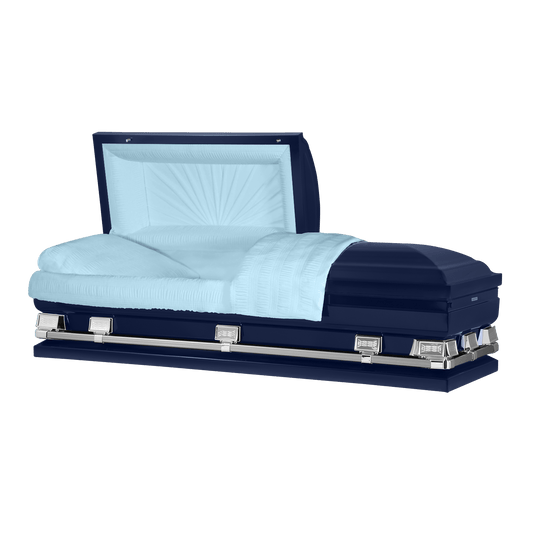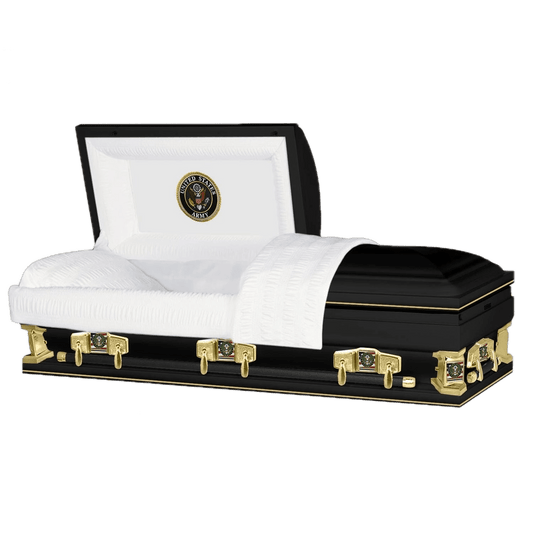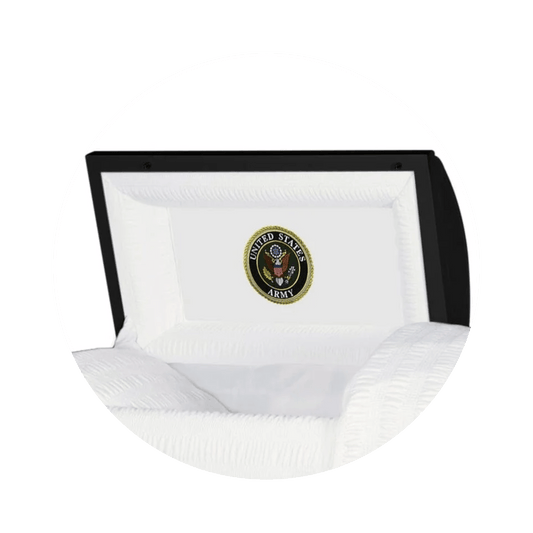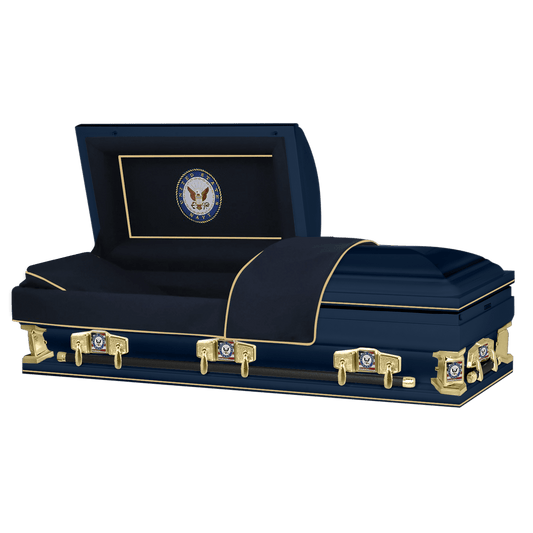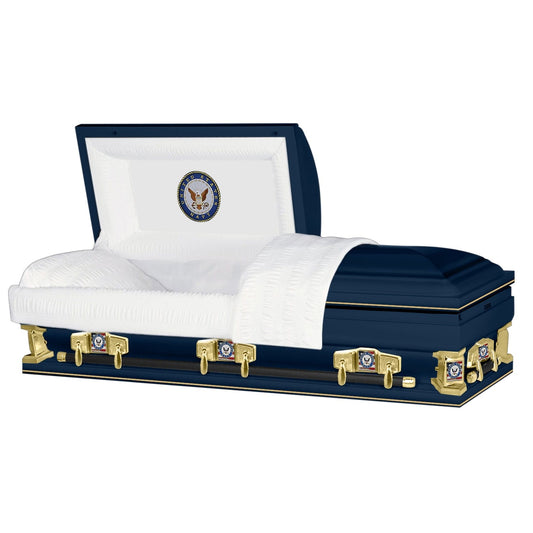The impact of losing a loved one can be emotionally staggering, and the additional challenges of finalizing the legal details of their lives can add to the overwhelm. In addition to the typical measures that need to be taken after someone’s passing, from buying a casket to handling their digital legacy, there are specific steps that may be necessary if your loved one was a member of the U.S. military. Read on as Titan Casket offers suggestions about what to do when a veteran dies.
Get A Legal Death Pronouncement
When someone dies, they must be pronounced legally dead by a member of the medical community. It is critical to do this as soon as possible in order to receive a death certificate and finalize the deceased’s personal and financial affairs. If the deceased were being cared for at a Veterans Health Administration medical center, an independent hospital, or a nursing home, the medical team handling the case would take the necessary steps. Likewise, if a hospice care team was providing care during the deceased’s last days, they can make this declaration. When a veteran dies unexpectedly, you need to call for emergency services to transport your loved one to the hospital, where the emergency room team can make the legal pronouncement of death.
Plan Your Farewell with Grace – Our Pre-Planned Caskets Offer Peace of Mind
Gather Important Documents
A plethora of documentation is required to settle someone’s estate, and specific filings need to be made when a veteran dies. As soon as possible, start gathering the documents that are most commonly required to begin the process of planning a military funeral, choosing a final resting place, and requesting survivor’s benefits.
1. Official Copy of the Veteran’s Service Record
Check your loved one’s files for an official copy of their service record. This record should include information about their branch of service, their years of duty, and discharge information (aka a Certificate of Discharge) or other separation notice (Form DD-214). If you are unable to find this information and aren’t sure what to do or where to look, the VA recommends that the next of kin call the National Cemetery Scheduling Office at 1-800-535-1117. They will assist you in getting the discharge documents you may need to get military honors and schedule a burial in a national or state veterans cemetery. The next of kin can also request a veteran’s service record by sending a request to the National Personnel Records Center or contacting their county’s (or state’s) veterans agency.
2. Order Certified Death Certificate Copies
If you are working with a funeral home while planning end-of-life services, and the legal pronouncement of death has been made, ask for assistance in ordering at least 10 copies of the certified death certificate. This document will be required by everything from Veterans Affairs and life insurance companies to your loved one’s bank and brokerage firms. If you have chosen a DIY or at-home funeral, and your state’s rules and regulations allow it, a family member can prepare the death certificate, file it, and request copies. However, many states require that a funeral director file the death certificate and make the copy requests, even for at-home services. For more information on how to get a death certificate. It’s best to make this request as soon as possible in case there is a delay in receiving the certified copies.
3. Social Security Card
As you will have to inform the Social Security Administration when a veteran dies, it’s best to find the original social security card. This number will be used to verify your loved one’s identity, and it will be used with the death certificate to close a variety of accounts and pursue survivor benefits.
4. Veterans Affairs Claim Numbers
If your loved one had an active claim with Veterans Affairs, including tuition reimbursement bills under the GI Bill or disability claims, they would have been assigned a Veterans Affairs File Number (or VA claim number). It will be helpful to have this number or numbers when inquiring about claims after the veteran has died. The number should be referenced on any claim letters sent to your loved one by Veterans Affairs.
5. Official Marriage License
An official marriage license may be needed when claiming survivor benefits. You may be eligible for continued disability benefits (if your veteran spouse was receiving them prior to death), as well as financial assistance covering the burial. The license may be required when requesting the death payment, typically given to surviving spouses, by the Social Security Administration to help cover the burial (currently, $255), as well as veteran survivor’s benefits for you and any dependent children. You may also need the marriage license to receive life insurance payments, including life insurance sponsored by the VA, as well as employee benefits or other assistance.
6. Original Birth Certificates for Dependents
It is a good idea to collect the original birth certificates for any of the veteran’s dependent children. As is the case with spouses, surviving dependent children may be entitled to an array of benefits and assistance programs. You may need the original birth certificates as proof of eligibility before collecting those benefits.
7. Insurance Policies
Many veterans are enrolled in life insurance policies that are sponsored by the VA. It’s important to have a copy of that policy, along with any other life insurance policies, when you contact the providers to inform them of your loved one’s passing. While you should contact them directly (many of the VA insurance numbers are listed here), keep in mind that you will need to send them an official copy of the death certificate before they issue benefits.
8. Property Documents
Deeds, home loan agreements (including those made through VA services), car loan agreements, and other property information should be collected when a veteran dies. Certain property may have had a “transfer upon death” order attached to them, making it possible for property ownership to be transferred without going through probate. If property was intended for children under the age of 18, you would need to consult the Final Will, if there was one, to find the designated property manager who will handle those affairs until the dependent heir turns 18. If you are uncertain about what to do when a veteran dies with existing property, seeking expert legal advice is your best course of action.
9. Last Will and Testament (aka Final Will)
The Last Will and Testament (also known as the Final Will) legally expresses the wishes of the deceased regarding the distribution of their assets, establishes guardianship for any minor children, and names the estate’s executor. If there are minor children, it will also establish a financial guardianship for properties left to them until their 18th birthdays.
Inform The Veterans Benefits Administration
Depending on your loved one’s status, there are a number of different departments to be informed when a veteran dies. For example, if your loved one was a veteran who was receiving a military pension or disability payments, you need to notify the Veterans Benefits Administration at 1-800-827-1000. You can also inform the Retiree Casualty Section of the Defense Finance and Accounting Service (DFAS) at 1-888-332-7411 if the deceased veteran had been a retiree. For a complete list of current numbers at the VA, click here.
Activate Veteran’s Burial Benefits
After you have alerted the Veterans Benefits Administration about your loved one’s passing, they can offer you information with regards to the benefits available to spouses and/or dependent children. In addition to providing financial assistance to help pay for funeral, burial, and transportation expenses, they may offer help (or work with your funeral director) in arranging military honors at the time of burial. Currently, when a veteran dies, their survivors can be eligible for more than $1,500 to help cover funeral costs, but those claims must be made within two years after the veteran’s death. Whether or not the veteran died a service-related death or due to other causes will impact the amount of the benefits payments.
Set The Funeral Plan
Whether you are working with a funeral home to arrange for services and schedule burial or cremation, or planning an at-home end-of-life celebration, you will need to make numerous decisions quickly. Among those decisions will be setting up the time for viewings and services, choosing speakers, selecting music, choosing pallbearers, and posting an obituary. When a veteran dies, these planning decisions will also include whether or not there will be military honors. If the deceased pre-planned their funeral, many decisions will have been made and the costs, often, covered. You can set their plan in motion. If not, you can work with Veterans Affairs, the funeral home, and family members to help plan end-of-life services. Click here for some specific suggestions on how to plan a military funeral.
Please note that in many places, COVID-19 restrictions may impact funeral services. It is best to discuss potential issues with your funeral director or consult your county’s public health office.
Buy A Military Funeral Casket, Coffin, Or Urn
You can purchase a coffin, casket, or urn from funeral homes and reputable online vendors, including Titan Casket. You can also buy funeral caskets and urns through channels like Amazon, Sam’s Club, Costco, and Walmart. It is important to note that when working directly with a company like Titan Casket, you can develop a relationship with a non-commissioned expert who can guide you through the many options available to you. Titan has a wide variety of military funeral caskets and coffins that honor veterans of all branches of the military, which feature branch-specific emblems and embroidered head panels. And buying a casket online can result in a savings of 85% or more on the price of a high-quality, handcrafted casket which, due to the FTC’s Funeral Rule, must be accepted at your funeral home of choice without any additional fees or penalties.
Choose The Perfect Final Resting Place
Choosing the perfect final resting place means selecting a tranquil location that has special significance to the deceased. Your loved one may have wanted to be buried close to their residence or in a cemetery that specifically honors their military service. In the United States, the National Cemetery System includes 171 “nationally significant” cemeteries. In addition, there are state and territory veterans cemeteries that have similar eligibility requirements; many have residency rules. When a veteran dies, if they were honorably discharged, they are eligible to be buried in a national or state veterans cemetery. A veteran can receive military honors whether they are buried in a national or private cemetery.
There is a process for scheduling burial in a national veterans cemetery. You can work with your funeral director or Veterans Affairs to begin the paperwork, which will require you to present the veteran’s discharge papers, social security number, and social security numbers for the surviving partners and children. You will also be asked to select multiple potential national cemetery options for interment; it’s critical that you rank your choices when filling out the paperwork. Gravestones that include the veteran’s highest rank and branch of service in addition to vital details will be placed for veterans buried in the National Cemetery System.
The most well-known of the national cemeteries in the United States is Arlington National Cemetery. Eligibility requirements for Arlington are narrower than in the rest of the System. Current rules dictate that “only active duty, military retirees, former prisoners of war, and recipients of the Purple Heart and other top awards may be buried at Arlington,” according to USA.gov.
Select Military Honors
What are military honors? Military funeral customs typically can include a bugler for the playing of Taps, casket-bearing pallbearers, a firing party for gun salutes, and the folding and presentation of the flag that draped the coffin. Headstones, grave markers, and medallions with military insignia and a presidential memorial certificate can be ordered. Military funeral customs also include two military members representing your veteran’s branch of service to assist in the proceedings. Even if your loved one is buried in a private cemetery, they can still receive military honors for free.
Experienced funeral directors will be able to walk you through the process of planning a military funeral, including deciding which honors you would like and are available to celebrate your loved one’s life. If you are planning a DIY end-of-life celebration, military recruiters as well as numerous organizations, including the American Legion Group, the VFW, and the Disabled American Veterans Charity, can help you schedule military honors.
Return VA-Issued Equipment
If you wonder what to do when a veteran dies with medical equipment or other “helping” aids, check to see if they were issued by Veterans Affairs. Equipment, including medical beds, wheelchairs, ramps, and hearing aids, can be returned to the VA. According to Veteran Aid, “you can arrange to have [these items] picked up from your home by calling the VA hospital’s Prosthetic Department.” If these items, along with many others, were purchased from private providers, they can be donated to your county’s Council on Aging.
Do you have more questions about what to do when someone dies or planning a military funeral? Titan Casket is here to help you get the funeral you want at a fair price.

![Upgrade to Premium Weight [18-gauge steel]](http://titancasket.com/cdn/shop/products/casketthicknesswithnumbers.png?v=1680642906&width=533)


